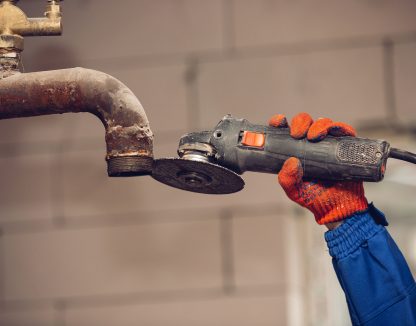Running a successful HVAC business involves more than just installing and maintaining heating, ventilation, and air conditioning systems. It also means safeguarding your company against unexpected challenges and risks. One crucial aspect of this protection is having the right insurance coverage in place. In this guide, we’ll break down the key components of HVAC business insurance, covering everything from HVAC insurance costs to the importance of workers’ compensation and general liability coverage.
Ready to Learn More?
What is HVAC Insurance?
HVAC insurance is a tailored and comprehensive safeguard for Heating, Ventilation, and Air Conditioning businesses, offering specialized coverage to mitigate a range of risks and liabilities inherent in the industry. This insurance encompasses a variety of policy types, each strategically designed to address the distinct challenges faced by HVAC professionals, ensuring robust protection against potential financial setbacks and unforeseen events.
Is HVAC Business Insurance Required?
Absolutely! It’s not just a smart move; in lots of cases, it’s actually a legal must-do. Skipping out on proper insurance could leave your business vulnerable to financial and legal headaches down the road. Whether you are a sole proprietor or running a large HVAC company, having the right insurance is a game-changer you wouldn’t want to miss out on.
What is a Certificate of Insurance?
A Certificate of Insurance (COI) is a document issued by your insurance provider that details your insurance coverage, including policy limits and expiration dates. When engaging with clients, especially in a contractual capacity, they may request a COI to verify that your business is adequately insured. Presenting a COI not only assures your clients of your commitment to responsible business practices but also grants them the peace of mind that comes with knowing they are working with an insured and reliable HVAC contractor.
How Much Does HVAC Insurance Cost?
On average, annual HVAC insurance costs can range from a few thousand to several thousand dollars. The dynamic cost of HVAC insurance is influenced by various factors, all playing a crucial role in determining the overall expense. Factors such as the size of your business, the scope of operations, and your geographical location contribute to the intricacies of insurance costs. Insurance providers carefully assess risks associated with the HVAC industry, including potential accidents, property damage, and injuries. To navigate this complex landscape, consulting with insurance professionals who specialize in HVAC insurance is advisable. This allows you to gain a deeper understanding of the specific coverage your business requires and helps mitigate potential financial burdens. Seeking guidance from insurance professionals is essential to obtain a precise estimate tailored to your business needs.
Types of HVAC Insurance
Worker’s Compensation Insurance
Worker’s compensation insurance stands as a cornerstone for any HVAC business. It provides coverage for medical bills and lost wages in the unfortunate event that one of your employees sustains an injury while on the job. Given the nature of the HVAC industry, where employees often work with complex systems and tools, the risk of injury is inherent. Workers’ compensation not only safeguards the well-being of your employees but also shields your business from potential legal expenses related to workplace injuries. By prioritizing the safety and security of your workforce, you create a robust foundation for the success of your HVAC business.
Commercial Auto Insurance
For HVAC businesses that rely on vehicles to transport technicians and equipment to job sites, commercial auto insurance is an indispensable component. This coverage is designed to protect your HVAC business vehicles and employees in the event of accidents, ensuring that you can continue serving your clients without interruption and mitigate potential financial repercussions.
HVAC Contractor Insurance
Tailored specifically for HVAC companies, contractor insurance consolidates various coverages to address the unique risks associated with HVAC systems. This comprehensive insurance package may include general liability, tools and equipment insurance, and coverage for potential damage to HVAC systems during installation or maintenance. HVAC contractor insurance provides a holistic approach to risk management, offering a safety net that ensures your business can navigate challenges with resilience and confidence.
Tools and Equipment Insurance
Tools and equipment insurance is specifically designed to cover the repair, replacement, or reimbursement for essential gear that may be damaged, lost, or stolen. The tools and equipment utilized in the HVAC industry are the backbone of your business operations. This coverage ensures that your HVAC business remains operational even in the face of unexpected setbacks, providing financial stability and peace of mind.
General Liability Insurance
General liability insurance is a fundamental component of HVAC business insurance. This coverage protects your business from claims related to bodily injury or property damage that may occur during your operations. In the HVAC industry, where technicians often work in diverse environments and settings, the potential for accidents is ever-present. General liability insurance is a shield, mitigating the financial impact of lawsuits, legal expenses, and potential damages. By securing this coverage, your HVAC business can navigate the complexities of liability with confidence, allowing you to focus on delivering high-quality services to your clients.
What are the Benefits of HVAC Business Insurance?
Primarily, this insurance offers robust financial safeguards, shielding the enterprise from unexpected incidents like accidents, injuries, or property damage that could otherwise pose substantial financial burdens. Beyond financial protection, it serves as a crucial tool for legal compliance, mitigating the risk of potential legal consequences that may arise in the absence of coverage. Possessing comprehensive insurance elevates the credibility of the HVAC business, fostering trust and confidence among clients and partners who are reassured by the proactive measures taken to manage potential risks and uncertainties. In essence, HVAC business insurance emerges as a strategic and integral asset for sustaining a secure, compliant, and reputable business operation.
The multifaceted nature of HVAC insurance, encompassing workers’ compensation, commercial auto insurance, contractor insurance, and general liability, reflects the diverse risks inherent in the industry. The peace of mind that comes with knowing your business is adequately covered against potential risks, such as bodily injury, property damage, or medical bills, is invaluable.
To tailor a comprehensive insurance policy that aligns with your specific business needs, consulting with insurance professionals is highly recommended. By doing so, you not only fortify your business against unforeseen challenges but also pave the way for sustained success and growth in the competitive HVAC landscape.
Partner with Payzer
In navigating the complex landscape of HVAC business insurance, partnering with a reliable and industry-focused platform like Payzerware can provide additional advantages. Payzerware offers tailored solutions that align with the unique needs of HVAC contractors. From streamlining payment processes to creating custom maintenance agreements, Payzerware simplifies HVAC business management, allowing you to focus on business growth.







